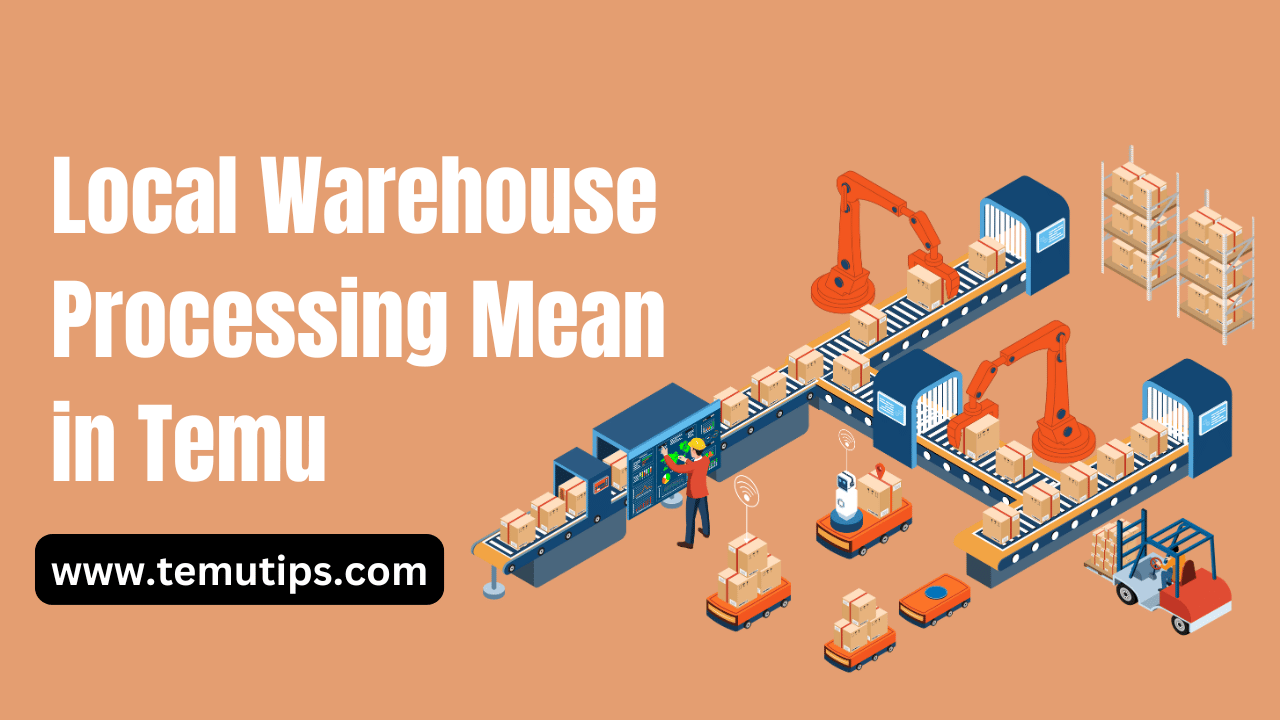The term “local warehouse processing” is gaining prominence in global e-commerce, particularly on platforms like Temu. This process is pivotal in ensuring customers receive their orders faster while reducing costs associated with international shipping.
For those unfamiliar with how it works, the concept can seem complex. This article will explain the meaning of local warehouse processing, its significance for Temu, and its impact on customer satisfaction and business operations.
Understanding Local Warehouse Processing
Local warehouse processing refers to the method by which products are stored, packed, and dispatched from warehouses located within a specific region or country.
This system is designed to expedite the shipping process, improve inventory management, and ensure timely delivery. For e-commerce platforms like Temu, this involves maintaining strategically located warehouses near their target customer base.
The Role of Local Warehouses in E-commerce
Local warehouses play a critical role in modern e-commerce. Their primary functions include:
- Stocking Products: Maintaining an inventory of frequently purchased items to minimize wait times.
- Order Fulfillment: Packaging and processing orders for quick dispatch.
- Returns Management: Handling product returns locally, which simplifies the process for customers.
- Customer Support: Offering faster resolution of issues related to orders and returns.
By leveraging local warehouses, companies like Temu can streamline operations and reduce their reliance on international logistics.
How Temu Implements Local Warehouse Processing
Temu, known for its competitive pricing and diverse product offerings, utilizes local warehouse processing to optimize its logistics. Here’s how the process works on Temu:

- Product Selection: Vendors supply products based on demand trends in specific regions.
- Inventory Stocking: Temu stores these products in local warehouses to meet regional needs.
- Order Processing: When a customer places an order, it is processed directly from the nearest warehouse.
- Shipping and Delivery: Products are shipped locally, reducing delivery times significantly.
- Returns Management: Returns are handled within the same region, simplifying the process for customers.
This system minimizes delays and ensures a seamless shopping experience.
Advantages of Local Warehouse Processing for Temu
Local warehouse processing offers numerous benefits to both Temu and its customers.
Faster Delivery Times
With products stored in local warehouses, delivery times are drastically reduced. Customers no longer need to wait weeks for items to arrive from international locations.
Reduced Shipping Costs
Shipping locally is more cost-effective than international shipping. Temu passes these savings on to customers, making their platform more competitive.
Improved Customer Satisfaction
Quick deliveries and hassle-free returns lead to higher customer satisfaction, fostering loyalty and repeat purchases.
Better Inventory Management
By analyzing regional demand, Temu can stock warehouses with high-demand items, ensuring availability and reducing instances of stockouts.
Environmental Benefits
Local processing reduces the carbon footprint associated with international shipping, aligning with sustainability goals.
Challenges of Local Warehouse Processing
While beneficial, implementing a local warehouse strategy comes with its challenges.
High Initial Investment
Setting up warehouses requires significant investment in infrastructure, staff, and logistics.
Complex Logistics
Managing inventory across multiple warehouses demands efficient coordination to avoid overstocking or understocking.
Compliance with Local Regulations
Operating warehouses in different regions necessitates adherence to local laws, which can be time-consuming and costly.
Unpredictable Demand
Fluctuations in demand can make it challenging to maintain optimal inventory levels, potentially leading to losses.
The Role of Technology in Local Warehouse Processing
Technology is a cornerstone of successful local warehouse processing. Temu employs various tools and systems to ensure efficiency:
Inventory Management Systems
These systems track stock levels, predict demand, and automate restocking to maintain optimal inventory.
Order Tracking Software
Advanced tracking tools provide real-time updates on order status, enhancing transparency and customer trust.
Warehouse Automation
Technologies like robotics and AI streamline operations within warehouses, reducing manual errors and increasing speed.
Data Analytics
Temu uses data analytics to study consumer behavior and optimize warehouse locations and inventory.
Comparison of Local Warehouse Processing with Traditional Logistics
To understand the significance of local warehouse processing, it’s essential to compare it with traditional logistics models.
Delivery Times
- Traditional logistics often involve lengthy international shipping timelines.
- Local warehouse processing ensures quicker deliveries, often within days.
Costs
- Traditional logistics incur high shipping and customs fees.
- Local processing reduces these costs by shipping within the same region.
Customer Experience
- Traditional logistics can lead to delays and dissatisfaction.
- Local warehouse processing enhances customer satisfaction with faster and more reliable service.
Case Studies: Temu’s Success with Local Warehouse Processing
Rapid Growth in Key Markets
Temu’s implementation of local warehouses has contributed to its rapid growth in regions like North America and Europe. By analyzing demand trends, Temu has strategically placed warehouses to cater to high-demand areas.
Improved Return Rates
With local returns processing, customers find it easier to return items, leading to higher trust and repeat business.
Enhanced Operational Efficiency
Through automation and technology, Temu has minimized errors in order processing, reducing operational costs and improving overall efficiency.
The Future of Local Warehouse Processing in E-commerce
As e-commerce continues to evolve, local warehouse processing will play an even more significant role.
- Expansion of Warehouse Networks: Companies will likely increase their warehouse presence to cater to a broader audience.
- Integration with Advanced Technologies: Emerging technologies like IoT (Internet of Things) and blockchain will further enhance warehouse operations, improving tracking and transparency.
- Focus on Sustainability: Local warehouses will adopt greener practices, such as renewable energy and electric vehicles for delivery, to align with environmental goals.
Conclusion
Local warehouse processing is a transformative approach in e-commerce, particularly for platforms like Temu. By leveraging local warehouses, Temu delivers faster, more cost-effective, and reliable service to its customers. While the system comes with challenges, the benefits far outweigh the drawbacks, making it an essential component of modern e-commerce strategies.
As technology and consumer expectations continue to evolve, local warehouse processing will remain a cornerstone of efficient and customer-centric e-commerce operations. For Temu, this strategy not only drives business growth but also enhances customer loyalty, ensuring long-term success in the competitive e-commerce landscape.

Muhammad Ahmad is a dedicated writer with 5+ years of experience delivering engaging and impactful content. He specializes in simplifying complex topics into easy-to-read articles.
